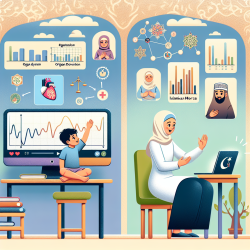How Understanding Islamic Moral Codes Can Enhance Your Speech Therapy Practice
As a speech-language pathologist, you're dedicated to improving the lives of children through effective, evidence-based interventions. However, have you ever considered how understanding diverse cultural and religious perspectives can enhance your practice? Recent research titled The moral code in Islam and organ donation in Western countries: reinterpreting religious scriptures to meet utilitarian medical objectives offers insights that can be applied to our field, particularly when working with children from diverse backgrounds.
The Research Findings
The study by Rady and Verheijde (2014) explores the complexities surrounding organ donation in Western countries from an Islamic perspective. The key points of the research include:
- The interpretation of religious scriptures and advice from faith leaders are significant barriers to organ donation among Muslims.
- Transplant advocates have proposed interventions like reinterpreting religious scriptures, reeducating faith leaders, and utilizing media campaigns to overcome these barriers.
- The research argues that such interventions may violate the dignity and inviolability of human life, values that are integral to the Islamic moral code.
Applying These Insights to Speech Therapy
Understanding these findings can have practical implications for speech-language pathologists, especially when working with children from Muslim families. Here are some actionable steps you can take:
1. Culturally Sensitive Assessments
When conducting assessments, consider the cultural and religious backgrounds of the children. For instance, understanding the importance of religious scriptures in decision-making can help you tailor your approach to be more respectful and effective.
2. Family-Centered Interventions
Engage with the families to understand their perspectives and incorporate their beliefs into the intervention plans. This approach not only builds trust but also ensures that the therapy is more aligned with the family's values.
3. Collaborate with Community Leaders
Just as the research suggests reeducating faith leaders, you can collaborate with community leaders to better understand the cultural nuances and gain their support in your therapeutic interventions.
Encouraging Further Research
The research by Rady and Verheijde (2014) opens the door to many questions that could be explored further. For instance, how do different cultural beliefs impact the effectiveness of speech therapy interventions? What strategies can be employed to better integrate cultural sensitivity into clinical practice?
Encouraging further research in these areas can lead to more inclusive and effective therapeutic practices, ultimately improving outcomes for all children.
Conclusion
Incorporating the insights from diverse cultural and religious perspectives can significantly enhance the effectiveness of speech therapy interventions. By being culturally sensitive and family-centered, we can create more inclusive and impactful therapeutic environments for children.
To read the original research paper, please follow this link: The moral code in Islam and organ donation in Western countries: reinterpreting religious scriptures to meet utilitarian medical objectives.










